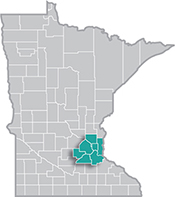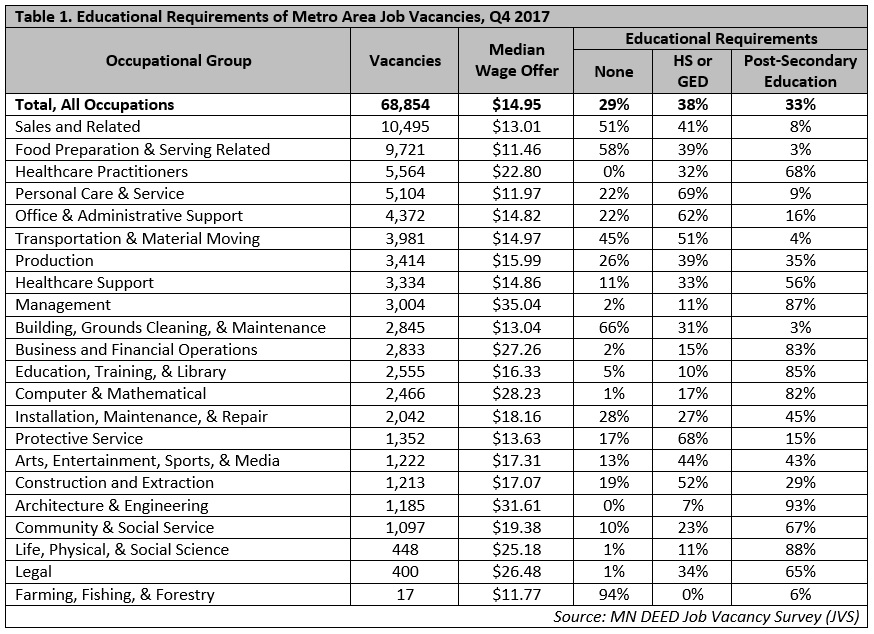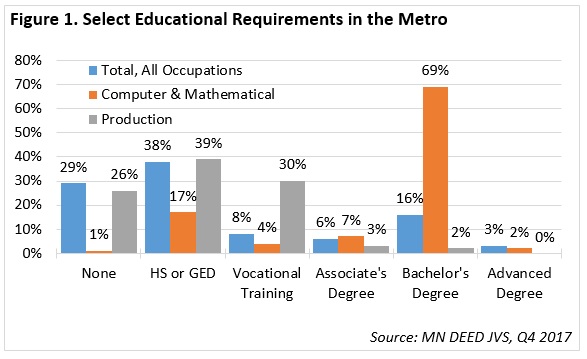 The Minneapolis-St. Paul metropolitan area is a national leader in finance, advanced manufacturing, agriculture and retailing.
The Minneapolis-St. Paul metropolitan area is a national leader in finance, advanced manufacturing, agriculture and retailing.
Medical devices, electronics and processed foods are strong suits recognized globally.
Want the freshest data delivered by email? Subscribe to our regional newsletters.
6/27/2018 5:00:00 PM
Tim O'Neill
There is zero doubt that the Twin Cities Metro Area is experiencing very tight labor market conditions. Data from DEED’s fourth quarter 2017 Job Vacancy Survey show there were nearly 69,000 job vacancies reported by employers in the region. As of April 2018, unemployment in the Twin Cities dipped down to 2.6 percent, which represented approximately 44,300 unemployed persons actively looking for work. Assuming job vacancies are still at similar levels, that means there are just 0.6 unemployed persons for every job vacancy in the Metro Area.
So where are these job vacancies, and what education is required for them? Table 1 highlights occupational groups in the Twin Cities Metro Area by number of vacancies and educational requirements listed by employers. For example, Sales and Related and Food Preparation and Serving occupations had the most job vacancies reported by employers, with 10,495 vacancies and 9,721 vacancies, respectively. The vast majority of these openings require a high school diploma or less. In contrast, two-thirds of the 5,564 Healthcare Practitioners and Technical vacancies required some level of post-secondary education.

When navigating the labor market in the Twin Cities, it is important for students, job seekers, and others to keep a close eye on the educational requirements of different occupations. This can lead to better educational and career outcomes. For example, 71 percent of Computer and Mathematical occupations required a bachelor’s degree or more. So if you’re hoping to become a software developer, computer systems analyst, or database administrator, you should plan on obtaining at least a bachelor’s degree.
Counter to Computer and Mathematical occupations, 69 percent of Production occupations required a high school diploma or equivalent or vocational training (Figure 1). Top in-demand occupations here include machinists, welders, and CNC operators. While higher education typically results in higher wages, there are thousands of in-demand and high-wage occupations in the Metro Area that don’t require extensive levels of post-secondary education. With technical and on-the-job training, welders in the Metro Area make a median hourly wage of $22.24.

To learn more about educational requirements for occupations in the Metro Area, visit DEED’s Career and Education Explorer or CareerOneStop. Also check out DEED’s Trends publication for interesting articles, including College has Value even for Non-Completers, Education and the Gender Gap, and Connecting Careers and Education.
Contact Tim O’Neill at 651-259-7401.